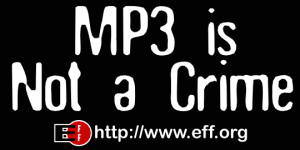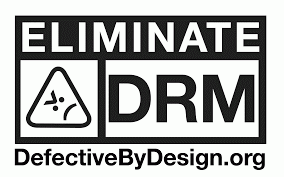I am not a proponent of DRM (digital rights management). DRM intrudes upon fair use laws.
DRM controls how you use your media and this extends to software, videos, music, photos and eBooks, since they are digital files. For example, if you purchase a digital picture, DRM, as determined by the distributor of the picture you purchased, may control how many times you view it, how many copies you may keep, whether you can print it, how many computers or devices you can view the file on, and if you can share it with others. While such is not the case with photos yet, such is the case with eBooks, software, audio and video files.
 iTunes used to only let users burn a particular playlist 7 times. While Apple called this ‘generous,’ restricting what you can do with music that you legally purchased was obviously wrong. In this case, it was very clear that public sentiment was against Apple’s draconian DRM policies and users won, resulting in iTunes dropping their restrictions on users from exercising their legal rights under copyright.
iTunes used to only let users burn a particular playlist 7 times. While Apple called this ‘generous,’ restricting what you can do with music that you legally purchased was obviously wrong. In this case, it was very clear that public sentiment was against Apple’s draconian DRM policies and users won, resulting in iTunes dropping their restrictions on users from exercising their legal rights under copyright.
Although DRM has faded from the spotlight, it is still an issue. That’s why I use GNU/Linux at home and try to only use free software – although that is not always possible, due to work or other software needs. I do own a laptop with Windows as the OS, but I chose to load it up with LibreOffice instead of MS Office, VLC instead of Windows Media Player or iTunes, and purchase DRM free Ogg / FLAC / MP3 files either from the Google Store, Amazon.com or directly from an artists’ site – Alabama Shakes and The Black Keys plugs here!
Please learn more about DRM, how it intrudes upon your right to use your own legal files, and the dangers that it poses to fair use laws.
Support EFF:
“The Electronic Frontier Foundation is the leading nonprofit organization defending civil liberties in the digital world. Founded in 1990, EFF champions user privacy, free expression, and innovation through impact litigation, policy analysis, grassroots activism, and technology development. We work to ensure that rights and freedoms are enhanced and protected as our use of technology grows.”
From Wikipedia:
“Civil libertarians… argue that transferring control of the use of media from consumers to a consolidated media industry will lead to loss of existing end-user rights, as well as stifling innovation in software and cultural productions. No current DRM technology includes a mechanism to enable fair use rights”
Lastly, check the Guide to DRM-Free Living and free alternative software.

